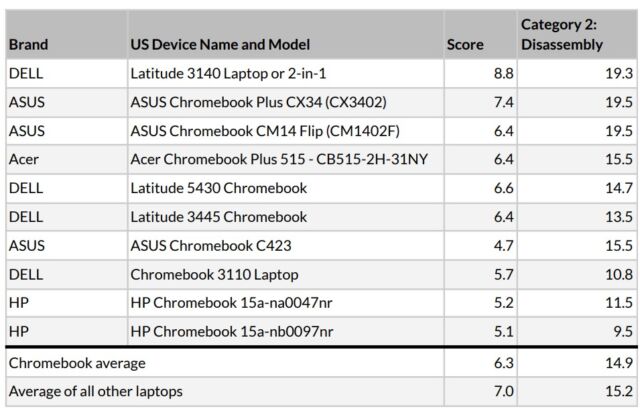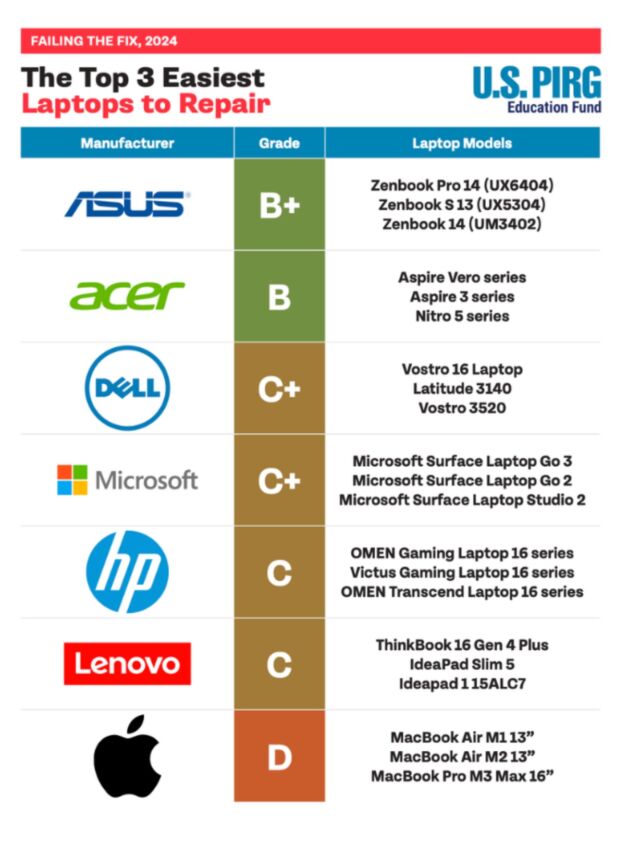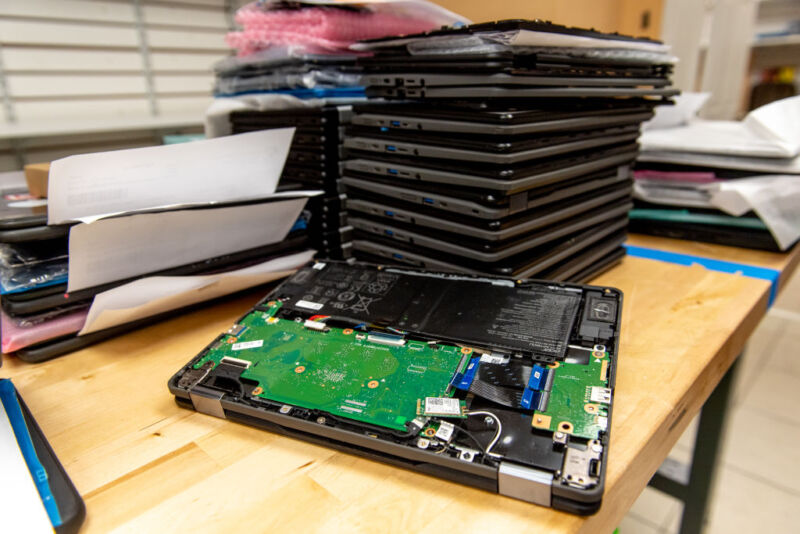Chromebooks and MacBooks are among the least repairable laptops around, according to an analysis that consumer advocacy group US Public Interest Research Group (PIRG) shared this week. Apple and Google have long been criticized for selling devices that are deemed harder to repair than others. Worse, PIRG believes that the two companies are failing to make laptops easier to take apart and fix.
The “Failing the Fix (2024)” report released this week [PDF] is largely based on the repairability index scores required of laptops and some other electronics sold in France. However, the PIRG’s report weighs disassembly scores more than the other categories in France’s index, like the availability and affordability of spare parts, “because we think this better reflects what consumers think a repairability score indicates and because the other categories can be country specific,” the report says.
PIRG’s scores, like France’s repair index, also factor in the availability of repair documents and product-specific criteria (the PIRG’s report also looks at phones). For laptops, that criteria includes providing updates and the ability to reset software and firmware.
PIRG also docked companies for participating in trade groups that fight against right-to-repair legislation and if OEMs failed to “easily provide full information on how they calculated their products.”
Chromebooks, MacBooks lag in repairability
PIRG examined 139 laptop models and concluded that Chromebooks, “while more affordable than other devices, continue to be less repairable than other laptops.” This was largely due to the laptops having a lower average disassembly score (14.9) than the other laptops (15.2).
The report looked at 10 Chromebooks from Acer, Asus, Dell, and HP and gave Chromebooks an average repair score of 6.3 compared to 7.0 for all other laptops. It said:
Both of these lower averages indicate that while often considered an affordable choice for individuals or schools, Chromebooks are on average less repairable than other laptops.
Google recently extended Chromebook support from eight years to 10 years. PIRG’s report doesn’t factor in software support timelines, but even if it did, Chromebooks’ repairability score wouldn’t increase notably since the move only brought them to “industry norms,” Lucas Gutterman, Designed to Last campaign director for the US PIRG Education Fund, told me.

He added, though, that the current “norm” should improve.
At the very least, if it’s no longer financially viable for manufacturers to maintain support, they should allow the community to continue to maintain the software or make it easy to install alternative operating systems so we can keep our laptops from getting junked.
Turning to its breakdown of non-ChromeOS laptops, PIRG ranked Apple laptops the lowest in terms of repairability with a score of D, putting it behind Asus, Acer, Dell, Microsoft, HP, and Lenovo. In this week’s report, Apple got the lowest average disassembly score out of the OEMs (4 out of 10 compared to the 7.3 average)

It’s unsurprising to see MacBooks at the bottom of PIRG’s list. Apple has long been criticized for designs that might sacrifice ease of repairability for design or technical needs. But with many states moving toward right-to-repair legislation over the past couple years, Apple has recently been making an about-face when it comes to the right-to-repair. A once-storied opponent of right-to-repair legislation, Apple now supports California’s right-to-repair bill and launched a Self Service Repair program.
Compared to last year’s report, Apple did boost its disassembly, laptop documentation, parts availability, and parts pricing scores, but that wasn’t enough to bring it to a respectable repairability score in PIRG’s eyes.
“Despite improvements, MacBooks are still too difficult to open up and repair compared to all the other laptops brands we reviewed,” Gutterman said.
It’s worth noting that PIRG looked at various devices for each computer brand. For example, the report considered eight Apple laptops and 48 Dell laptops. This is largely because PIRG only included models with French repairability index scores that are also sold in the US. However, the advocacy group thinks the scores are still helpful for comparing the general repairability of laptops from each brand. Gutterman explained:
We choose to average the results across however many models are available for sale in the US directly from manufacturers, be that 5 or 50, because we feel it’s the best way to score the brand as a whole. These grades help consumers know if the manufacturer’s products tend to be more or less repairable than others. If Brand A only sells 5 models which are all repairable and brand B sells 50 with a wide range of score but which tend to be less fixable on average, the average consumer’s will find brand A more repairable than Brand B.
Harder to take apart
PIRG found that the laptops it examined for this year’s report are, on average, harder to disassemble than the machines examined last year, with the average disassembly score dropping from 7.5 to 7.3, “which indicates that manufacturers are failing to design laptops that are easier to disassemble and repair.”
Gutterman said this seems “counterintuitive” since “it should be easier to make repairable laptops than phones because of the form factors.” The exec hypothesized that laptops are falling behind phones in repairability because “the minimum acceptable floor of repairability for cell phones is higher due to existing and proposed EU regulations mandating the fixability of phones.”
Another PIRG hypothesis, Gutterman said, is: “The market feedback cycle is faster for phones due to their shorter life spans. In other words, consumers are more outraged that they have to replace each member of their family’s $1,000 phone every other year because it’s not designed to last, than they are about replacing laptops every four years or so.”
But with innovators like Framework pushing the envelope around laptop durability, repairability, and upgradability and more laws supporting easily repairable devices, including for national repairability scores, there’s a serious reason for Chromebooks and MacBooks (and other types of devices) to strive to get their repairability grades up.
Google and Apple didn’t respond to requests for comment for this story.
